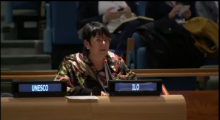Women’s economic and political empowerment

"Investing in public services can play a determinant role in empowering women by helping them to overcome poverty and accessing the labour market. Childcare and elderly care services, education and healthcare are sectors that can really stimulate women's employment while ensuring the economic growth of society and a higher quality of life for people."
“Years of economic crisis and austerity measures have put many working women in vulnerable situations, even in developed countries, and have caused even more unemployment amongst women,” said Ms Pavanelli in her address to the panel discussion.
On the occasion of International Women’s Day, the President of the UN General Assembly convened a High-level Thematic Debate focusing on gender issues. Debate participants explored the importance of promoting gender equality and empowering women and children in the context of the future development agenda.
PSI is also participating actively in the negotiations on the UN Sustainable Development Goals and Financing for Development which will frame the post-2015 Agenda. PSI advocates for change and is lobbying for an urgent alternative to the current neo-liberal policy. In particular, PSI advocates for public investments in public services, because this is the way to support the social and environmental sustainability of economic growth. The gender perspective is particularly important as women are more vulnerable to neo-liberal policies and austerity measures.
For more information:
- See the UN Website
- View the video on YouTube
- Follow the trade union delegation at UNCSW59 on the unioncsw blog, on Facebook, on Twitter @unioncsw

